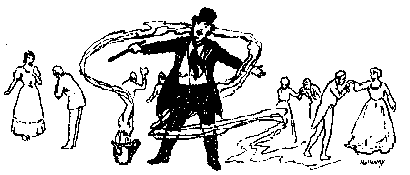Gilbert & Sullivan Opera
A History and a Comment
by H. M. Walbrook
CHAPTER IV.
GEORGE GROSSMITH'S FIRST PART.

We now reach the beginning of the years of Gilbert and Sullivan at the Opéra Comique, a charming little theatre which had been opened seven years before by the renowned comedienne, Mlle. Déjazet, and a French company, and had its entrances in staircases from Holywell Street and a long tunnel from the Strand. It had no pit, but excellent seats could be booked for halfacrown each in a large and very com
Here, on the night of Saturday, November 17th, 1877, the curtain rose for the first time on the two-act original modern comic opera, The Sorcerer, or the Elixir of Love. The piece was founded on a story which Gilbert had contributed a year before to the Christmas number of The Graphic, and which was illustrated by comic drawings signed "Bab" in the author's funniest vein. In this story it is the village curate, the Rev. Stanley Gay, who orders the love-philtre from Messrs. Baylis and Culpepper, Magicians, Astrologers, and Professors of the Black Art, with an address in St. Martin's Lane. Of this firm we read:
Baylis had sold himself to the devil at a very early age, and become remarkably proficient in all kinds of enchantment. Culpepper had been his apprentice, and, having also acquired considerable skill as a necromancer, was taken into partnership by the genial old magician, who from the first had taken a liking to the frank and fair-haired boy.
The curate orders and pays for a nine-gallon cask of the Patent Oxy-Hydrogen Love-at-First-Sight Philtre, and distributes the potion, with various embarrassing consequences, among others that of losing his own fiancée to his Bishop!
The opera takes its title from an advertising vendor of love potions, a Mr. J. W. Wells, of St. Mary Axe, who, although endowed with all the demoniac powers claimed by a Cagliostro, is yet attired in the black frock coat, top hat and grey trousers of respectability. He ends by going "down below" in a glow of red fire, but is observed to be carefully drawing on his gloves as he disappears, and the last sign we have of him is a cheerful cascade of his professional cards, which flutter up through the glare. His love potion can be purchased either "in the bottle or in the wood (for laying down)," and it acts like the juice of the little western flower in Shakespeare's fairy comedy, which makes man or woman madly dote upon the first live creature that it sees. In the opera, as in the original Christmas story, it brings about disastrous incongruities, which, however, in Gilbertian fashion, are easily straightened-out during the concluding five minutes or so.
Among other things the piece satirizes old-fashioned stilted manners, the muffler and slipper popularity of curates, the pose of aristocratic benevolence, and the inebriety of the working man. There is, however, no dominating tendency of any sort in it. It is little more than a collection of comic ideas mixed into a plot. The libretto is neat but lacks the well-knit strength of tile later Gilbert. Compare, for example, the patter song '' My name is John Wellington Wells" with "If you want a receipt for that popular mystery" in Patience, and you will see how Gilbert's technique ripened in the sunshine of success — and also in the shadow of strenuous labour.
The score, heard by itself as "absolute music," would be charming. The Vicar's song, "Time was when love and I," is always being sung somewhere; Aline's "0, happy young heart!" is a brilliant valse song with a stirring accompaniment; the duet between Sir M. Pointdextre and Lady Sangazure, "Welcome, joy, adieu to Sadness!contains a Mozart-like minuet, and the teacup brindisi, "Eat, drink and be gay!" in the finale of the first Act is admirable. The quintet in the second Act, "I rejoice that it's decided," is one of the prettiest things Sullivan ever wrote in the Mendelssohnian manner, and had a tumultuous welcome at the first performance; while in the duet that follows between Mr. Wells and Lady Sangazure there is a divertingly sepulchral andante and a no less comic tarentello-like allegro.
The part of the Sorcerer introduced the late Mr. George Grossmith to the stage for the first time. For twelve years he remained with the company, playing all the leading Low Comedy parts. His voice, considered from the musical point of view, was nothing, but his articulation of words, even when sung at a very rapid pace, was so distinct that he could be heard and understood all over the house. He could also dance very quaintly, as he proved both in this opera and in its successor, and he had a comical and very flexible countenance, the mere photograph of which could set a crowd laughing, as I can bear witness to from what I saw happen in the Strand when his picture as the Lord Chancellor, in Iolanthe, with a broad grin on his face, was first shown in the shop windows. He was probably more a comedian than a humorist; and the story has often been told of his introducing a piece of "business" into The Mikado which Gilbert failed to appreciate as humorous." But it makes the audience laugh, sir," persisted the comedian. "So also would it if you were to sit on a pork pie," was the author's chilly retort. Mr. Grossmith's best performance was that of the First Lord in H.M.S. Pinafore, though his own pet part was that of the jester in The Yeomen of the Guard, in which his pathetic touches were certainly much admired. Probably, however, no actor, amateur or professional, has ever failed in the scenes of Jack Point's pathos, the composer helping them as he does with his beautiful music.
Mr. Grossmith was one of those actors who, as a rule, are not at their best on "first nights," just as Henry Irving was one to whom the opposite applied. A sort of stage-fright on these occasions rendered the comedian at the mercy of the situation instead of being in complete command of it. This was notably the case on the first night of The Mikado. Even in The Sorcerer his John Wellington Wells was a far more entertaining person on the fiftieth night than he had been on the first. Take him for all in all, however, Mr. Grossmith was probably the most accomplished, as he was certainly the most popular, comic artist who has so far appeared in Gilbert and Sullivan Opera.
